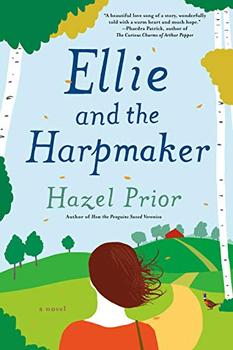Summary | Excerpt | Reading Guide | Reviews | Beyond the Book | Readalikes | Genres & Themes | Author Bio

"It's funny," she mused, her eyes wandering around the barn again. "Harp playing was on my list."
I asked if she meant her shopping list.
She paused and looked at me with arched eyebrows. "No, my before-forty list. Lots of people have them, apparently. You know—the list of things to do before you reach the age of forty. Like swimming with dolphins and seeing the Great Wall of China."
I asked if she had swum with dolphins and she said no. I asked if she had seen the Great Wall of China and she said no. Then she added that she had a few years to go yet. I asked her how many, but she didn't answer. Perhaps I shouldn't have asked her that. There are lots of things you are not supposed to ask, and I fear that might be one of them. So I changed my question and asked her what would happen if she didn't manage to swim with dolphins or see the Great Wall of China or play the harp before she reached the age of forty. She said, "Nothing."
We were silent for a bit.
"It smells lovely in here," she commented finally. "I love the smell of wood."
I was glad she had noticed it because most people don't, and I was glad that she appreciated it because most people don't. Then she gestured toward the harps. "They're utterly exquisite," she said. "Will you tell me something about them?"
I told her yes. I informed her that they are Celtic-style traditional harps and they would have been fairly widespread in Britain during the Middle Ages, especially in the north and west. I told her I had carved the Elfin from my own design out of the sycamore tree that had fallen by the brook four years ago. I mentioned that I had made the Sylvan from ancient beech and the Linnet from rosewood. I showed her the drawers of strings and explained about the red ones being Cs, the black ones being Fs and the white ones being As, Bs, Ds, Es and Gs. I told her about each one being a different thickness and the importance of tension. I showed her the holes in the back and how they were anchored inside. I explained the use of the levers for sharpening the note. I told her about the pebbles. I gave her a couple of pieces of wood so that she could hold them and compare the weight. I expanded on the different resonances of different woods.
Then I realized that I had not asked very much about her, so I stopped telling her things and I asked the following eight questions: How are you? Do you have any pets? What is in your enormous shoulder bag? What is your favorite color? What is your favorite tree? Where do you live? Do you enjoy being the Exmoor Housewife? Would you like a sandwich?
She answered me the following answers: fine, thank you; no; a big camera and a notepad and a thermos with soup; red; birch; about five miles southwest of here; um; that would be very nice.
I made twelve sandwiches using six slices of bread and substantial quantities of cream cheese. I cut them into triangles because I reckoned she was a lady.
I've noticed that the act of cutting always helps me think. I do some good thinking when I cut up wood to make harps too. That might have been why, over the triangles of the sandwiches, I came to a decision.
2
Ellie
"He gave you one?"
"Yes."
"Just like that?"
"Well, pretty much."
Clive lowered the motoring magazine and transferred his full attention to my face. His eyebrows drew together and two deep vertical creases appeared between them.
"I presume you're having me on?"
"No," I said, and added a "Not" to underline it.
"So he offered, and you just took it?"
"Well, it was . . . it was hard to say no."
This was going to be tricky. I couldn't explain it to myself, let alone offer an explanation to anyone else. Which was why I'd been driving around Exmoor for the last half hour—with frequent stops to look in the back of the car and check that it was true—before I finally headed homeward.
Excerpted from Ellie and the Harpmaker by Hazel Prior. All rights reserved. No part of this excerpt may be reproduced or reprinted without permission in writing from the publisher.
Your guide toexceptional books
BookBrowse seeks out and recommends the best in contemporary fiction and nonfiction—books that not only engage and entertain but also deepen our understanding of ourselves and the world around us.